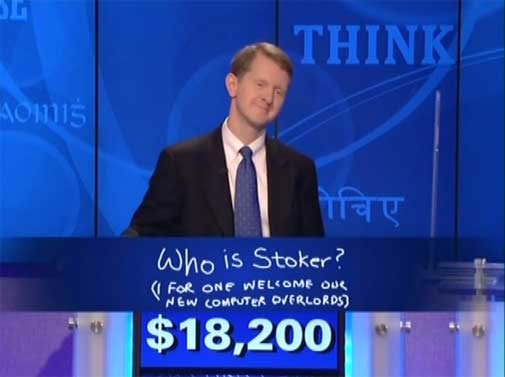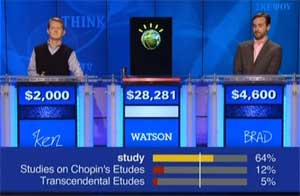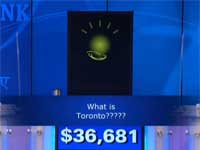
Ken Jennings, until now the best contestant ever to play Jeopardy!, was trounced by IBM's Watson supercomputer in this week's two-game, three-day duel -- but in the final "Final Jeopardy," accepted defeat in a way that was lovably, laughably human. Beneath his correct answer of "Bram Stoker," Jennings added, "I, for one, welcome our new computer overlords"...
It was a fabulous display of artificial intelligence -- and of intelligent television.

Like IBM Deep Blue's defeat of chess grandmaster Garry Kasparov in the 1990s, this week's showdown on the syndicated Jeopardy! series, pitting IBM's Watson against Jennings and fellow human super-contestant Brad Rutter, was a televised fable for modern times.
It was John Henry against the steam drill all over again. And this time, it was drill, baby, drill, all the way.
Well, almost all the way. There was one point, in Wednesday's final game, where Ken Jennings took advantage of a Daily Double doubling of his total to amass a substantial lead over both his human and inhuman competitors. But Watson kept going, kept giving correct answers, and wound up winning both games handily.
Well, if handily applies when you don't have hands.
What was most fascinating about the contest wasn't the intellectual beatdown that took place as Watson got so many things right -- seven in a row at one point, five in a row at another -- but the rare times Watson slipped up.

Danger Mouse, for example, was one of the few pop references to elude his memory-bank search. And in the first game's Final Jeopardy category, "U.S. Cities," Watson answered with a city that wasn't even in the United States: Toronto. (To be fair, Watson knew he didn't know, and followed his answer with several question marks.)
At another time, Watson gave the same incorrect response as Jennings had just given. Watson has no ears, and played the game with no concern about what others were doing or saying.
Watson also had some uniquely peculiar algorithms when it came time to wager specific amounts on Daily Doubles. The first time Watson was given the opportunity to wager all or part of his winnings, Watson offered the oddly precise amount of "$6,435."
"I won't ask," host Alex Trebek said, shaking his head and drawing a huge laugh from the studio audience.
At the end of the three-day experiment, Trebek tried to ease the pain of the computerized trouncing by pointing out that "Watson was developed by some very talented PEOPLE."
Yeah, and so were the Cylons that staged a revolt against humanity in Battlestar Galactica.
I'll take TV WARNED US for $1000, Alex...